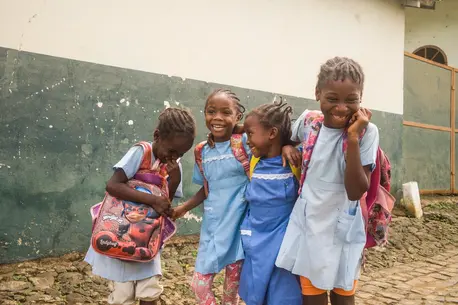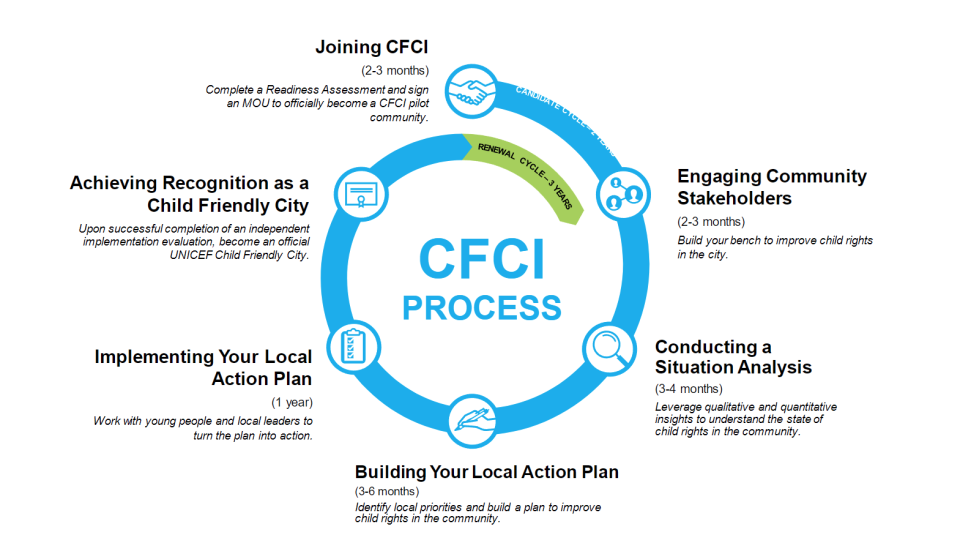
BECOME A CHILD FRIENDLY CITY
Become a UNICEF Child Friendly City in the United States
Originally created in 1996, UNICEF’s Child Friendly Cities Initiative uses a child rights-based framework to build a roadmap for establishing safer, more just, equitable, inclusive and child-responsive cities and communities around the world. Since its inception, CFCI has been adopted in over 500 municipalities in 40 countries.
In 2020, UNICEF USA launched the Child Friendly Cities Initiative in the United States, and continues to support several communities embarking on the ambitious multi-year transformative process toward recognition as a UNICEF Child Friendly City or County.
That cohort includes Alton, Illinois, Boulder, Colorado; Decatur, Georgia; Houston, Texas; Minneapolis, Minnesota; and Prince George's County, Maryland.
On Aug. 12, 2023, the City of Houston became the first officially recognized UNICEF Child Friendly City in the United States. On February 14, 2024, the City of Minneapolis joined Houston as the second city to receive recognition as a a UNICEF Child Friendly City.
The process of becoming a UNICEF Child Friendly City (or County) is determined by local context, such as political environment, population size and available resources. Leaders across each pilot city or county, including young leaders, work together through a CFCI task force to take the following six key steps:
- Joining CFCI: Complete a Readiness Assessment and sign an MOU to officially become a CFCI pilot community
- Engaging Community Stakeholders: Build your bench to improve child rights in your community.
- Conducting a Situation Analysis: Leverage qualitative and quantitative insights to understand the state of child rights in the community.
- Building Your Local Action Plan: Identify local priorities and build a plan to improve child rights in the community.
- Implementing Your Local Action Plan: Work with young people and local leaders to turn the plan into action
- Achieving Recognition as a Child Friendly City: Upon completion of a successful independent implementation evaluation, become an official UNICEF Child Friendly City.

After a city has conducted a situational analysis and developed a local action plan approved by UNICEF USA, they can become a Child Friendly City Candidate. After the action plan has been implemented and the city has successfully undergone an independent implementation evaluation, the Child Friendly City Candidate can apply to receive designation from UNICEF USA as an officially recognized UNICEF Child Friendly City for a set period of time.
While each community’s version of the initiative may look different, each city must meet the following criteria — also required of global CFCIs — to be officially recognized as a UNICEF USA Child Friendly City:
results for children within the scope of several goal areas to ensure a comprehensive child rights approach
meaningful and inclusive child participation through established mechanisms, such as child and youth councils throughout all the phases of the CFCI process
demonstrated dedication to eliminating discrimination against children and young people in policies and actions by the local government, including in CFCI
UNICEF has over 75 years of experience protecting children
Throughout the CFCI partnership, UNICEF USA provides participating cities communities with:
- technical expertisetraining and awareness raising on CFCI implementation
- convening power
- the equity of a global brand
- a diverse network of dedicated volunteers
- global and national networking opportunities
In addition to engaging its CFCI pilot cities and county, UNICEF USA is building a national CFCI Learning Community of city officials, subject matter experts and advocates to exchange resources and learning opportunities to put children first in local governance and decision making.
UNICEF also offers a free self-led course describing the core components and steps that communities can take to become child friendly.
Being a Child Friendly City is not an end goal but rather a continuous practice
CFCI recognition in the United States is not an accreditation model. Rather, it is a transformative process through which local governments and stakeholders commit to advancing child rights.
Over time, the idea is for the process in each city to evolve and develop to protect children against new challenges. CFCI is not about creating perfect cities — and should never be considered an approval of the human rights situation of the city as a whole. CFCI is about improving children’s well-being and building the better future they deserve.
For more information, resources and case studies about the global UNICEF Child Friendly Cities Initiative, join the CFCI Facebook Group, email cfci@unicefusa.org or visit childfriendlycities.org.